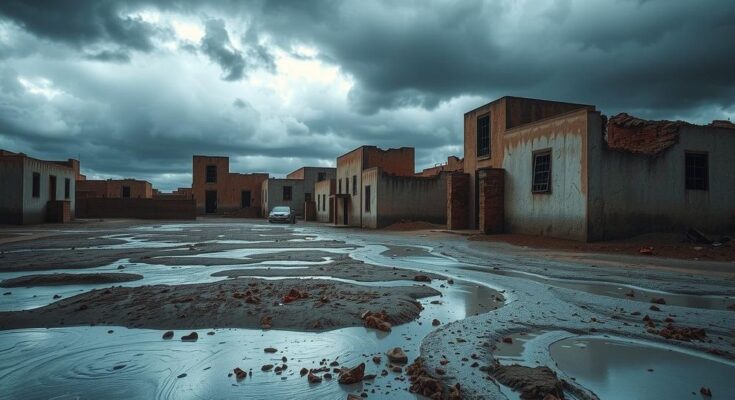Morocco’s earthquake victims are enduring severe conditions during Ramadan due to heavy rains flooding their camps, delaying promised aid. Many families continue to live in makeshift tents as reconstruction efforts remain stalled amid reported mismanagement of funds. Political criticism highlights the disparity between government priorities and the urgent needs of affected survivors.
In Morocco’s Atlas Mountains, earthquake survivors face dire conditions as heavy rains have inundated their camps, transforming them into muddy pools during the holy month of Ramadan. Victims, who had hoped to be residing in new homes by now, are instead finding themselves living in collapsing tents, as their plight continues with no promised aid in sight since the devastating earthquake in September 2023.
For over a year, families in Talat N’Yaacoub have been forced to dwell in temporary shelters meant to last only weeks. Many individuals have lost their homes and are now forced to endure damp and dangerous conditions. Halima, a mother of three, expressed the desperate situation, saying, “The tents are no longer liveable […] Water seeps inside, the mud rises up, and we have nothing to keep warm.”
The Moroccan government had previously announced a significant recovery initiative, promising aid of 140,000 dirhams for families whose homes were completely destroyed. However, local activists report that many beneficiaries receive far less. Despite claims of progress, such as 57,000 building permits issued, the reality in the Al-Haouz province starkly contrasts with these figures. Hussein Ait Mahdi from the Al-Haouz Earthquake Victims group highlighted that the actual financial assistance is inadequate for the affected families.
Transportation remains an obstacle, as delivering supplies to remote areas incurs significant costs. Such expenses hinder the ability to provide adequate aid. Moreover, allegations of mismanagement have emerged, with claims of manipulated beneficiary lists. Said Ait Mahdi, who was imprisoned on dubious charges after speaking out, represents the determination of the community to push for accountability amid widespread corruption in aid distribution.
The plight of those inhabiting tents intensifies with changing weather conditions, impacting the most vulnerable populations, particularly children and the elderly. Essential services are far away, and the risk of minor illnesses becoming critical is a significant concern. Cooking indoors is also perilous as it poses risks of fire hazards. As Ramadan brings its own challenges, families find themselves grappling with an overwhelming sense of burden rather than comfort.
In political arenas, frustration is mounting due to the slow pace of reconstruction, with opposition lawmakers criticizing government priorities that appear focused on global sports events, such as the upcoming World Cup. MP Fatima Al-Tamani emphasized the disconnect between infrastructure investments and the immediate needs of families still living in tents nearly 18 months post-disaster. As Morocco prepares to co-host the 2030 World Cup, the juxtaposition of flourishing developments against the backdrop of “the forgotten Morocco” continues to provoke public debate.
Requests for a statement from Morocco’s Minister of National Territory Planning and Housing have gone unanswered, leaving many pressing needs unmet during this crucial period.
The current situation in Morocco’s Atlas Mountains illustrates the grim reality faced by earthquake survivors as they continue to live in tents under heavy rains during Ramadan. With delayed aid and inadequate shelter, families are left in dire straits while government responses remain unsatisfactory. The ongoing issues such as transportation costs for supplies and mismanagement of aid distribution exacerbate the suffering, revealing a clear need for immediate action and accountability. The stark contrast between government projects and the dire needs of survivors encapsulates a growing frustration that demands urgent attention.
Original Source: www.newarab.com




